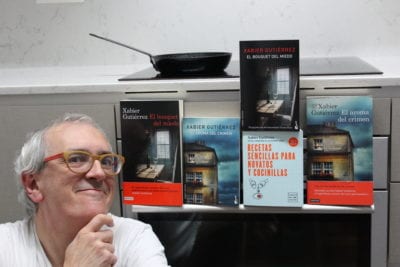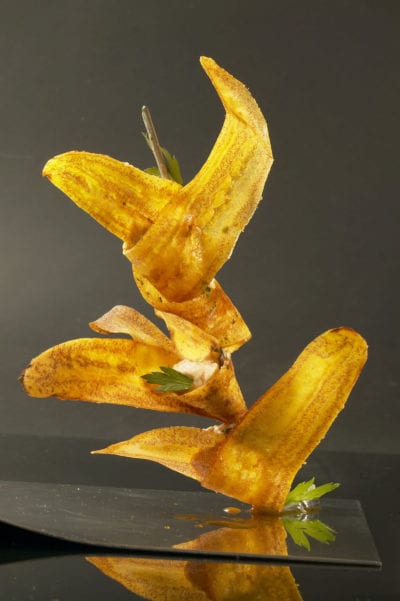
Xabier Gutiérrez: Author of the tetralogy El Aroma del Crimen.
We are pleased to have today on our blog with Xabier Gutierrez, San Sebastian, 1960, creator of gastronomy noir, in which the black genre takes place between stoves and signature dishes. Xabier is one of the most renowned chefs in our country and author of the tetralogy Los Aromas del Crimen, starring the deputy commissioner of the Ertzaintza, Vicente Parra.
Before dying, he savored his last dish. But this time there was a slight difference from the long list of dishes he had written about in the newspaper where he worked: this had been prepared by him with the help of the two fucking strangers who had attacked him. And it tasted of blood and the aroma of the charcoal where they had roasted the pork chop that he had just finished eating two hours ago. And also to death. " (Critical flavor, Xabier Gutiérrez)
Actualidad Literatura: Three books, a new genre and an ertzaintza as the protagonist. You provide your admirers with the pleasure of tasting unthinkable delicacies that drive their palates crazy and then you decide to stir their souls with the evil and desperation that crime hides. How does a brilliant, award-winning and recognized chef like Xabier Gutiérrez come to crime novels?
Xavier Gutierrez:
I arrived many years ago. The first time I found out was when I was the tender age of thirteen. First I did it with a book that I will never forget. Time of silence. (Luis Martin Santos) And from my audacity I imagined that I could also do that. Or at least something similar. Foolishness I think that thought is called, hahaha. My life has been girded with words. I'm from letters viscerally. I like to play with them. Make them say what they have hidden. I'm a bit shy and sometimes I use words as a shield to protect myself. They have the virtue of expressive silence. What is said without saying a word has an intimate presence. And almost eternal permanence. No wind will take them away.
AL: Writers mix and centrifuge their memories and the stories they have heard to create characters and situations. Your inspiration comes from the kitchen, your natural environment, the one you master, where you feel comfortable. And right there, the crime appears. In your books, a winemaker, a food critic, and various people related to the world of gastronomy have already died. Do ideas arise from real moments, from events experienced in kitchens, or is it pure imagination that you set the scene in the environment you know best?
XG: My novels are all fiction, peppered with reality. The game is finding where I have seasoned it. It is evident that when you know the environment well, sometimes you fall into the temptation to generate the environment or the close characters, but it is clear that this is not the case. I create situations from my imagination. But it is also true that your imagination, which is part of the generation of a creative process, is the result of your own observation and it may fool you by remembering beings or situations that you have lived but are unable to remember. It is a game in which you often let yourself be carried away unconsciously.
AL: The scent of crime, The bouquet of fear y Critical flavor, the latter published in 2017. We are missing the last work of the tetralogy and your readers wonder if we are going to stay if more cases of Vicente Parra, will the career of our favorite ertzaintza end with his next case?
XG: In principle it is a tetralogy and ends with the fourth installment (Black Rose Perfume) which we hope will come out soon. In the last one, hidden things are discovered from the first installment. This is expected to be the case, although you already know that all four are self-closing novels. To continue with the same policeman, I do not rule it out, even to make a prequel that I already have sketched but only with three lines. I do not know. Now I find myself finishing the new novel. The first outside the subcommissary of the ertzaintza Vicente. I am delighted and I only think of being able to finish it. There are barely twenty or thirty pages left.
AL: Vicente Parra, ertzaitza, in his fifties, fond of puzzles, married and father of a family, with a son who studies cooking, intelligent, curious and with a big heart. Vicente is not a great gourmet, despite the fact that he eats at home like in a luxury restaurant. What has Xabier given Vicente and Vicente Xabier?
XG: What a nice question. I think many things. We have grown up together. I have taught him to eat, that is clear. To reflect on the pleasant sensation that gastronomy directly linked to culture supposes. Because if you renounce the pleasures of food, you are withdrawing half of the best pleasures that a person can experience at a stroke. LOL.
But he has taught me to be a little more orderly, more thoughtful. Maybe a little less visceral. Just a little. I still love and hate from the guts.
On the other hand, Vicente and I are equally stubborn and we love our women, I think, with the same intensity.
But Vicente has given much more to me than I to him. It has shown me that almost always if you want, you can. It is a recipe that many times, not always unfortunately, works. Good dose of work and believing in yourself. Together they move mountains.
Sometimes I have told it. I can do shit, okay, okay, but it's mine and I BELIEVE in it. And for them I kill.
To Vicente and his family (as important as the murder plot) I owe a twist to my life that has made me discover new things. I have laughed with them, I have cried my eyes out, goose bumps have given me. Each of them is part of a cast of sensations. From a seesaw as close as life itself. After all, it's another one, made of paper, the one I created for them. I am very grateful to him for showing them to me.
To the grandfather I owe his personality, to his eldest son the dealings with his girlfriend. I don't know, I could tell you about each and every one of them.
Someday I'll invite him to dinner at the Arzak, .. hahahaha, I owe it to him.
AL: Director of the innovation department of the Arzak Restaurant in San Sebastián, collaborator of various media, consultant for hospitality companies, professor in a restaurant management master, several published and award-winning cookbooks and writer of crime fiction. Where does the time for everything come from?
XG: The day has 24 hours and you can't even imagine the amount of things that can be done during the 1440 minutes they have.
You will have time to rest when you die, .. hahaha. Do not take it at face value. No seriously, it goes a long way. I write in the morning for a couple of hours. It is difficult for me to write more, to create. Later, in the afternoon, I correct.

Xabier is Arzak's Director of Innovation.
AL: I never ask a writer to choose between his novels, but I do ask to know you as a reader. In your case, curiosity is greater than ever: will Xabier's favorite books be cookbooks, a gastronomic novel, perhaps a classic crime novel…? What is that book that you remember with special affection, that it comforts you to see it on your shelf? Any author that you are passionate about, the kind you buy the only ones that are published?
XG: They are a mix of all. I like mystery and suspense. They are key and in my novels I try to convey it. I like the classics but also ours. Lorenzo Silva, Dolores Redondo or Carlos Bassas. Also the Nordics although sometimes I find them a bit cold.
One book I will not forget is The Exorcist by William Peter Blatty.
I usually run to the bookstore if the last one from King comes along.
My other source of inspiration is the cinema. I drink from him and sometimes they criticize me that my novels resemble movie scripts. It comes out like this.
AL: What are the special moments of your professional career? Those that you will tell your grandchildren.
XG: I hope to tell my grandchildren that they had a grandfather who had a great time doing what he wanted. Who loved close people. That he was true to his principles. That I won some awards. But,…. I will also have to tell you that I was wrong a thousand times and that I would give everything I have to fix it. But all of that is part of the game.
On a professional level I will tell you that writing was part of my life.
AL: In these times when technology is a constant in our lives, it is inevitable because of social networks, a phenomenon that divides writers between those who reject it as a professional tool and those who adore it. Almost 6.000 followers on Twitter, 2500 on Facebook, almost 3000 on Instagram, with a profile in which, true to your style, you mix gastronomy and literature. What do social networks bring you? Do they outweigh the inconvenience?
XG: Everything has advantages and disadvantages. It is a matter of valuing them and that the latter do not cover the former.
It is clear that social networks have a very positive part. They have opened a lot of space for people to know my books. Taking out more personal things is a little worse, although sometimes I do.
AL: Is it easier to earn a living writing or cooking?
XG: Doing things well is difficult in one way or another. If you want to be number one in the world, it's going to cost you whatever you do.
AL: Digital book or paper?
XG: Paper, it is more sensual.
AL: Does literary piracy hurt you?
XG: Yes. People have to realize it. That our work is just as respectable as what they do. I think we are doing well but there is still a long way to go.
AL: To close, as always, I am going to ask you the most intimate question you can ask a writer: why do you write?
XG: For fun.
Thanks Xabier Gutiérrez, I wish you many successes in all your professional and personal facets, that the streak does not stop and that you continue to surprise us with each new dish and with each new novel.